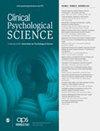Is Dosage of a Meditation App Associated With Changes in Psychological Distress? It Depends on How You Ask
IF 4.1
2区 医学
Q1 PSYCHIATRY
引用次数: 0
Abstract
Despite growing popularity, associations between dosage and outcomes in meditation-app interventions have not been established. We examined this relationship using a range of operationalizations of dosage (e.g., minutes of use, days of use, number and type of activities completed) and strategies for modeling outcomes (e.g., ordinary least squares regression, multilevel modeling, latent class analysis). We used data from a recently completed randomized controlled trial that tested a meditation app ( N = 662; 80.4% with elevated depression/anxiety) that included psychological distress as its preregistered primary outcome. Across 41 models, whether an association was detected and the shape and direction of this association varied. Although several models indicated that higher dosage was associated with larger decreases in psychological distress, many models failed to show this relationship, and some even showed the opposite. These results may have implications for optimizing and studying dosage in meditation apps and for open-science practices.冥想应用程序的剂量与心理压力的变化有关吗?这取决于您如何提问
尽管冥想应用干预越来越受欢迎,但其剂量与结果之间的关系尚未确定。我们使用一系列剂量操作(如使用分钟数、使用天数、完成活动的数量和类型)和结果建模策略(如普通最小二乘法回归、多层次建模、潜类分析)对这种关系进行了研究。我们使用了最近完成的一项随机对照试验的数据,该试验测试了一款冥想应用程序(N = 662;80.4% 患有抑郁症/焦虑症),并将心理困扰作为其预先登记的主要结果。在 41 个模型中,是否检测到关联以及这种关联的形式和方向各不相同。虽然有几个模型表明,剂量越大,心理压力的下降幅度就越大,但许多模型并没有显示出这种关系,有些模型甚至显示出相反的关系。这些结果可能对冥想应用程序中剂量的优化和研究以及开放科学实践有影响。
本文章由计算机程序翻译,如有差异,请以英文原文为准。
求助全文
约1分钟内获得全文
求助全文
来源期刊

Clinical Psychological Science
Psychology-Clinical Psychology
CiteScore
9.70
自引率
2.10%
发文量
35
期刊介绍:
The Association for Psychological Science’s journal, Clinical Psychological Science, emerges from this confluence to provide readers with the best, most innovative research in clinical psychological science, giving researchers of all stripes a home for their work and a place in which to communicate with a broad audience of both clinical and other scientists.
 求助内容:
求助内容: 应助结果提醒方式:
应助结果提醒方式:


